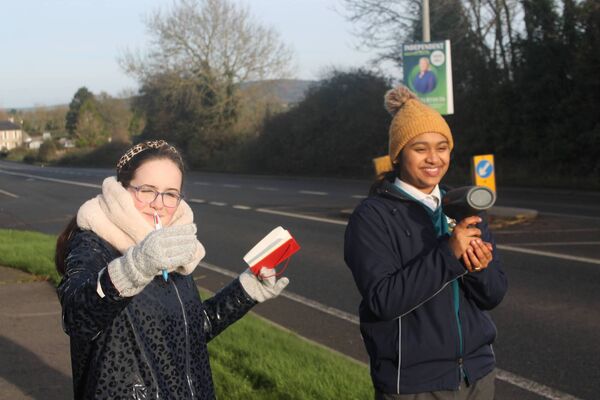Castledermot students reveal that speeding saves you minimal time

Claire, Róisín and Akhila receiving the Maths in Science Award at Scifest in SETU Carlow in April
WE'VE all seen cars speeding on our roads, but have you ever wondered how much time is actually saved by driving at these high speeds? Three third-year students from Coláiste Lorcáin, Castledermot, are exploring this very question. Akhila Thelakattu, Claire O’Sullivan, and Roisin O’Reilly, who won the Maths In Science award at Scifest@college in SETU last April, are now preparing their project for the BT Young Scientist & Technology Exhibition at the R.D.S. in January.
Their interest began with classroom speed investigations and expanded to include international initiatives like Vision Zero, a European strategy aimed at eliminating all traffic fatalities and severe injuries while promoting safe, healthy, and equitable mobility for all. The students started by recording traffic speeds in their local area and found that while most drivers adhere to speed limits, there are still instances of speeding.
Their project, titled “Educate to Decelerate,” aims to raise public awareness about how insignificant the time saved by speeding really is. For example, driving 10 km/h over the speed limit on a 50 km/h road for 30 km saves only 6 minutes but increases the risk of a traffic incident by 40%. On higher speed limit roads, the time saved is even less. Traveling at 130 km/h on a motorway for 100 km (just 10 km/h over the limit) saves only 4 minutes, and over 50 km, it saves less than 2 minutes.

The students believe that if drivers understood how little time is saved by speeding, especially on motorways, there would be less speeding and fewer accidents. According to the Road Safety Authority, there were 113 fatalities on Irish roads from January 1st to July 28th this year, with speed being a significant factor. One-third of these fatalities were individuals aged 25 or younger. The students are concerned that more lives will be lost if current driving habits don’t change. They argue that increased awareness of journey times and the minimal time saved by speeding could reduce incidents of speeding.
Akhila, Claire, and Róisín are excited to share their findings with the public at the R.D.S. exhibition from January 8th to 11th.





